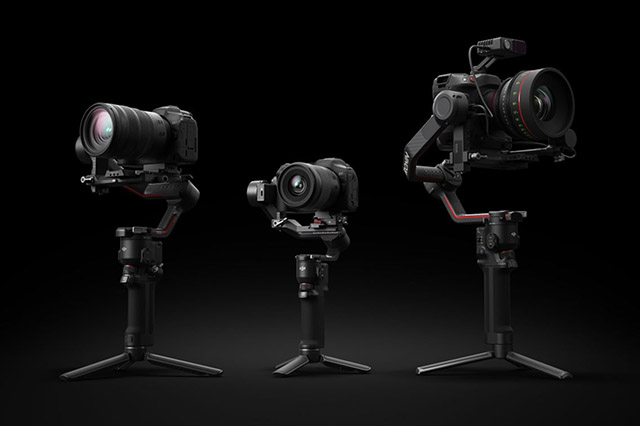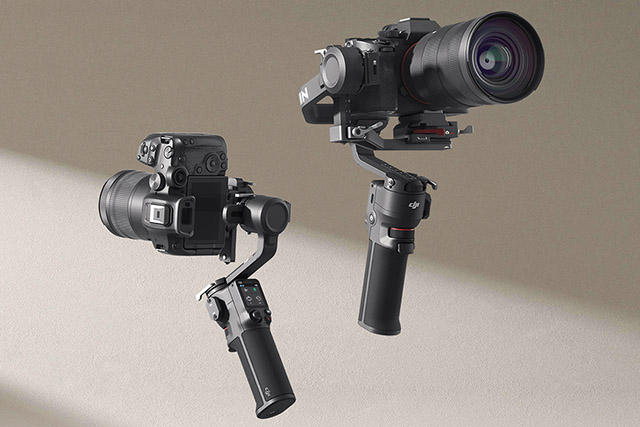DJI announces RS 3 Mini handheld gimbal for mirrorless cameras
posted Tuesday, January 10, 2023 at 3:45 PM EDT

DJI has announced the DJI RS 3 Mini handheld gimbal. The portable travel-oriented stabilizer is smaller and lighter than the existing RS 3 and RS 3 Pro gimbals released last year while still being able to support various full-frame mirrorless cameras and lenses, including popular combinations like the Sony A7-series and a 24-70mm F2.8 zoom. The gimbal can also work well with APS-C camera systems, like the Fujifilm X-H2(S) and Sony A6000-series cameras.
The DJI RS 3 Mini is approximately 40% smaller than the standard RS 3 and 50% smaller than the larger RS 3 Pro. The RS 3 Mini is quite a bit lighter than its siblings, too. The RS 3 Mini, which utilizes a new dual-layered quick-release plate and an all-in-one design, weighs just 795 grams (1.75 pounds) in its portrait mode and 850g (1.8 lbs) in the horizontal shooting mode with release plate. The RS 3 weighs 990g (2.2 lbs) in its gimbal arrangement, while a separate grip/tripod attachment increases the weight by around 200g (0.44 lbs). The RS 3 Pro gimbal weighs 1,143g (2.5 lbs). These weight differences may not seem like much, but they add up when doing extended handheld shooting, especially at challenging angles.
Of course, as you'd expect with a smaller, lighter design, the RS 3 Mini's payload is less than the RS 3 and RS 3 Pro's. The RS 3 Mini is tested to support up to 2 kilograms (4.4 lbs) of gear. On the other hand, the RS 3 supports 3kg (6.6 lbs), and the RS 3 Pro can handle up to 4.5kg (9.9 lbs) of equipment. The RS 3 Mini, with its lesser payload, can still support full-frame mirrorless cameras and popular zoom lenses, such as a Sony A7R V and Sony FE 24-70mm F2.8 G Master II zoom lens. It can also support similar camera and lens combinations, like the Canon EOS R5 and RF 24-70mm F2.8 or Nikon Z7 II and Z 24-70mm F2.8 S. To see the full list of compatible cameras, click here.

The DJI RS 3 Mini can connect to many cameras using Bluetooth, allowing for remote control of various functions such as the shutter, video recording and focus. With some Sony Power Zoom lenses, you can even use a built-in dial to control optical and digital zoom directly from the RS 3 Mini stabilizer. The RS 3 Mini has a built-in 1.4-inch touchscreen for menu navigation and supports subject circling, subject tracking, 3D roll, panorama, timelapse and more.
The RS 3 Mini's stabilization motors and third-generation RS Stabilization algorithm technology -- the same tech found in the RS 3 Pro – promise professional-grade image stabilization. The stabilizer can pan, tilt and roll at up to 360 degrees per second. The RS 3 Mini's mechanical range for panning is 360 degrees of continuous rotation. For the roll axis, the range is -95 degrees to 240 degrees. Along the tilt axis, it's -10 degrees to 210 degrees, which is less than the standard RS 3. The DJI RS 3 Mini can also record vertical video without any special attachment, which is convenient.

The DJI RS 3 Mini is not just smaller and lighter than the RS 3 and RS 3 Pro models, it's also significantly more affordable. The DJI RS 3 Mini is available starting today for $369. The DJI RS 3 and RS 3 Pro are available for $549 and $869, respectively. For more information on all three RS 3 series models, visit DJI.